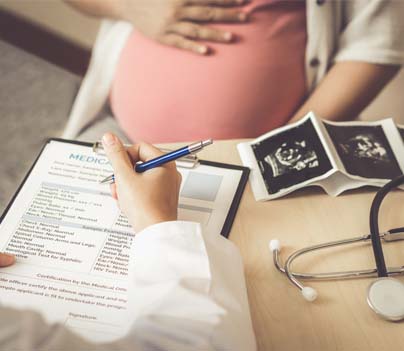An IVF procedure consists of various steps that are performed at defined time intervals. If necessary, several tests may also be performed at different stages of the procedure. At Pristyn Care, a cycle of IVF consists of the following steps:
Step 1. Tracking the menstrual cycle
IVF treatment requires multiple eggs to mature. Therefore, the fertility specialist starts the treatment by determining the best menstrual cycle time.
Step 2: Ovarian Stimulation
[Duration: 10 days]
In this step, the ovaries are stimulated with hormonal medicines to boost the growth of the follicles that contain the eggs. Hormones, including Follicle Stimulating Hormone (FSH) and Luteinizing Hormone (LH), are used in this process. After injecting the hormones, the IVF specialists monitor how the ovaries respond to the medicines.
Step 3: Trigger Injections
[Duration: 15 minutes]
The ovarian stimulation process is stopped when there are enough follicles in the ovaries. The hormone injections are discontinued, and the doctor determines the right time to administer trigger injections. These injections facilitate the process of meiosis. These injections contain hCG or Human Chorionic Gonadotropin, which helps the eggs mature and get released from the ovarian follicle wall.
Step 4: Egg Retrieval
[Duration: 30 minutes]
Commonly known as the ‘egg picking stage’, egg retrieval is a daycare procedure, and the patient can return home on the same day. It is performed under general anesthesia and is considered the only discomforting and slightly painful part of the IVF procedure. In this procedure, the doctor passes a fine, ultrasound-guided needle through the woman’s vaginal canal to collect mature eggs. Doctors generally collect 8 to 15 eggs during the procedure. Typically, this procedure takes just 30 minutes, and the patient can rest and go back home once the process is complete.
Step 5: Sperm collection
[Duration: 10 to 12 minutes]
In the next step, the doctor requires a sperm sample from the male partner. The male partner will be asked to produce the semen specimen and submit it to the lab. At Pristyn Care, we have dedicated rooms for collecting semen samples. We also provide home-sample collection to ease the process for the patients. In case the couple wishes to use donor sperm or frozen sperm, our specialists prepare the sample in the lab.
After collecting the sample, the doctors put it under a microscope and wash it with medicine to extract all the dirt and debris. This allows the doctors to have clean and healthy sperm for IVF, effectively fertilizing the eggs.
Step 6: Fertilization
[Duration: 3 to 5 days]
After washing and concentrating the sperm, the fertility specialists put it in an incubator with the eggs to start fertilization. This process replicates the natural fertilization process in which the sperm meets the eggs in the fallopian tubes.
Step 7: Embryo development
[Duration: 4 to 6 days]
The fertilized egg develops into an embryo. So, in the next step, the specialist collected the embryo and put it in an incubator to monitor its growth. After monitoring the embryo’s growth for 4 to 6 days, the developed embryo is mixed with the amino acids. If the growth is healthy and consistent, the embryo turns into a 4 to 8-cell embryo by the 4th day of this step.
Step 8: Embryo transfer
[Duration: 20 minutes]
Embryo transfer is a quick, 20-minute process that involves transferring the developed embryo from the incubator to the uterine wall inside the woman. The respective female is asked to lie down on her back with her legs spread. The specialist uses a soft, thin, and flexible catheter to collect the embryo. Then, a speculum is used to open the cervix, and the catheter is inserted through the cervix into the uterus of the woman.
The doctors perform an abdominal ultrasound to check that the tip of the catheter places the embryo correctly at the best location. Once the embryo transfer process is complete, the woman will be asked to remain in the lithotomy position for some time. This is done to ensure that the embryo stays in place and doesn’t fall out. Finally, she’ll be asked to return home and rest.
Step 9: Pregnancy check
[Duration: A couple of hours]
The final step of the IVF journey is a pregnancy check. A pregnancy blood test is performed two weeks after the embryo transfer. The blood test assesses the blood’s hCG levels, which help determine pregnancy. The presence of hCG indicates pregnancy. If the results are positive, our specialists will give you tips on how to ensure a healthy pregnancy journey.










.svg)





.svg)








